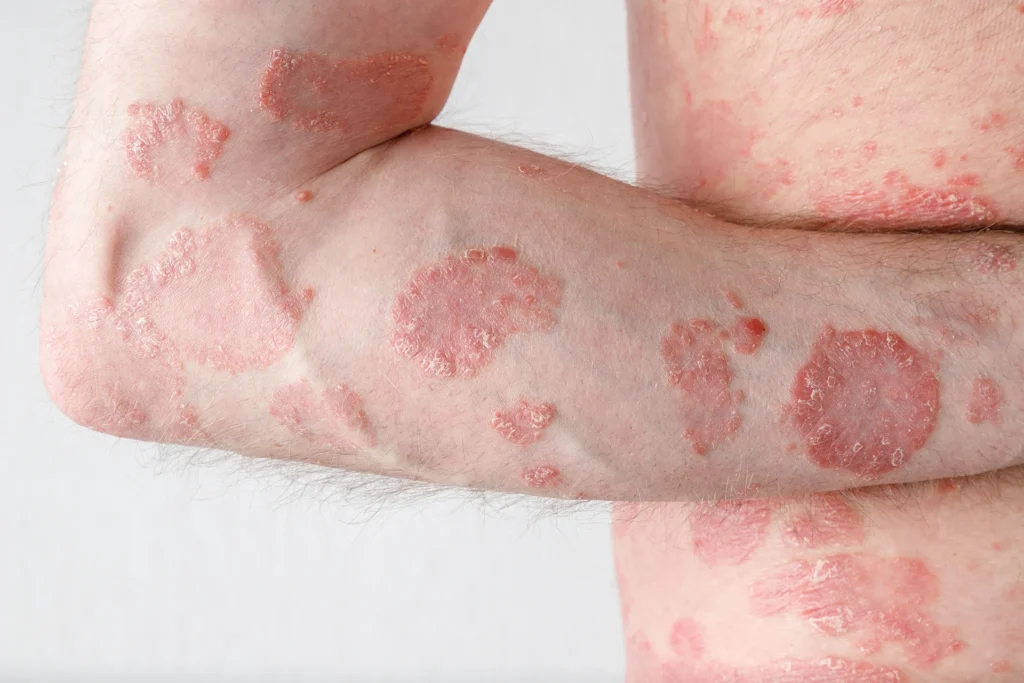Do you dread wearing short sleeves or avoid swimming because of your psoriasis? Does the constant itching, flaking, and discomfort affect your daily life? Psoriasis can be challenging, both physically and emotionally. If you or a loved one struggles with this condition, you may wonder if real relief is possible.
Here’s the encouraging news: while psoriasis has no permanent cure yet, modern dermatology offers highly effective treatments that can provide long-term symptom relief. At Worcester Dermatology Associates, we’ve helped countless patients regain their comfort and confidence with clear, healthy skin.
Psoriasis: More Than a Skin Condition
Psoriasis is an autoimmune disorder that accelerates skin cell turnover, causing thick, red plaques covered with silvery scales. This rapid buildup leads to itching, pain, and even cracking or bleeding. Many patients report feelings of embarrassment, anxiety, and self-consciousness beyond the physical discomfort that can lead to social isolation.
The Genetic Link
Psoriasis often runs in families. Scientists have identified genes linked to psoriasis, but having these genes doesn’t guarantee you’ll develop the disease. Environmental triggers often determine whether these genetic factors lead to active psoriasis.
Common Triggers: What Sets Psoriasis in Motion
Understanding what triggers your flare-ups is a key part of managing your psoriasis effectively. While everyone’s triggers differ, certain factors commonly worsen symptoms:
Stress
Psychological stress is a major trigger. Stress hormones increase inflammation, which can worsen psoriasis. This creates a cycle where symptoms cause more stress, leading to further flare-ups.
Infections
Strep throat and other infections can trigger psoriasis, especially guttate psoriasis, which appears as small, drop-shaped lesions.
Skin Injury
The Koebner phenomenon occurs when psoriasis develops at injury sites. Cuts, scrapes, insect bites, or friction from tight clothing can all trigger new patches.
Medications
Certain drugs, like beta-blockers, lithium, and antimalarials, may worsen psoriasis. Consult your dermatologist before making medication changes.
Weather and Climate
Cold, dry weather often aggravates psoriasis. Sunlight eases symptoms for some people but worsens symptoms for others.
Alcohol and Tobacco
Smoking and heavy alcohol use can increase psoriasis severity and reduce treatment effectiveness by promoting inflammation.
Types of Psoriasis
Psoriasis appears in different forms, each requiring specific treatment approaches:
Plaque Psoriasis
The most common type (80-90% of cases), it causes raised, red patches with silvery scales, often on the scalp, elbows, knees, and lower back.
Guttate Psoriasis
Triggered by infections like strep throat, this type appears as small, red spots, mostly on the trunk, arms, and legs.
Inverse Psoriasis
Affects skin folds (armpits, groin, under breasts) with smooth, red patches that worsen with friction and sweating.
Pustular Psoriasis
Characterized by white pustules on red skin, it can be localized (hands, feet) or widespread, requiring urgent care.
Erythrodermic Psoriasis
The rarest and most severe type, it covers large areas with a peeling, red rash. It requires immediate medical attention due to risks like dehydration and infection.
Psoriatic Arthritis
Affects up to 30% of psoriasis patients, causing joint pain, stiffness, and swelling. Early treatment is crucial to prevent joint damage.
Comprehensive Treatment Approaches for Psoriasis
Our dermatologists stay abreast of the latest advances in psoriasis treatment to offer our patients the most effective options available. Depending on the type, severity, and location of your psoriasis, we may recommend one or a combination of the following treatments:
Topical Treatments: First-Line Defense
For mild to moderate psoriasis, topical medications applied directly to affected areas often serve as the first line of treatment. These may include:
Corticosteroid Creams and Ointments: These reduce inflammation and slow skin cell turnover. Potency varies from mild to very strong, with stronger formulations typically reserved for smaller areas or more resistant plaques.
Vitamin D Analogues: Medications like calcipotriene help slow skin cell growth without the side effects associated with long-term steroid use.
Retinoids: Derived from vitamin A, topical retinoids such as tazarotene help normalize skin cell development and reduce inflammation.
Calcineurin Inhibitors: Tacrolimus and pimecrolimus can be particularly helpful for treating sensitive areas like the face or skin folds where steroid use may be problematic.
Salicylic Acid: This helps remove scales and smooth the skin. It’s often combined with other medications to enhance their effectiveness.
Coal Tar: One of the oldest treatments for psoriasis, coal tar can reduce inflammation, scaling, and itching. It’s available in various formulations, including shampoos for scalp psoriasis.
Moisturizers: Regular use of heavy, fragrance-free moisturizers helps reduce dryness, itching, and scaling while improving the skin’s barrier function.
Phototherapy: Harnessing Light for Healing
For moderate to severe psoriasis or cases that don’t respond adequately to topical treatments, phototherapy offers an effective non-medication option. At our Worcester office, we provide several phototherapy options:
Narrowband UVB: Our office features narrowband UVB light boxes, which emit a specific wavelength of ultraviolet light that’s particularly effective for treating psoriasis while minimizing risks associated with broader spectrum UV exposure.
XTRAC Laser: This excimer laser delivers a concentrated beam of UVB light directly to psoriasis plaques without affecting surrounding healthy skin. This targeted approach allows for higher doses of treatment and often faster clearing. The XTRAC laser is especially valuable for treating stubborn patches on the scalp, hands, and feet. Most insurance plans cover this effective treatment option.
Regular phototherapy sessions can significantly improve psoriasis symptoms, with many patients experiencing extended periods of clear skin. Your dermatologist will develop a personalized treatment schedule based on your specific needs and response to therapy.
Take the Next Step Toward Clearer Skin
If you’re struggling with psoriasis, the most important step is to consult with a dermatologist experienced in treating this complex condition. At Worcester Dermatology Associates, our specialists will conduct a thorough evaluation, discuss your symptoms and treatment goals, and develop a personalized approach to help you achieve clearer skin.
For personalized psoriasis evaluation and treatment, request a consultation online or call us at 508-744-3055. Our dedicated team is ready to help you find the relief you deserve.

